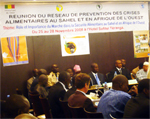24th Food Crisis Prevention Network Meeting
Dakar, Senegal
25-28 November 2008
|
The 24th annual Food Crisis Prevention Network (RPCA) Meeting, hosted by the Senegalese authorities, focused on the market’s role and its importance in the promotion of food security in the Sahel and West Africa. Network members also exchanged on the agricultural, food and nutritional situation for the 2008/09 campaign aiming to formulate policy recommendations and thereby facilitate decision-making. |
|
|
Background | Objectives | Topics | 2008/09 Campaign | Recommendations | Participants | Contacts & Documents |
|
Created in response to the catastrophic drought crisis in the Sahel region in 1984, the Food Crisis Prevention Network (RPCA) offers an open forum for discussion and action around food security issues in West Africa. The network brings together West African policy makers and leading international agricultural experts from international organisations (WFP, FAO, WMO), specialised NGOs, producer groups and researchers. The co-ordination of the network is mainly ensured by the CILSS and the SWAC. |
|
With cereal production estimated at 54 million tonnes of which 9 million tonnes are rice, the region has had an excellent 2008/2009 agricultural season. In the Sahel, cereal production is estimated at 15.5 million tonnes which is 21% greater than last year (2007/2008) and 24% compared with the average over the last five years. This record production is due in large part to the measures undertaken by States to support and strengthen producers’ capacities through specific programmes to boost agriculture, subsidies and free distribution of agricultural inputs, fiscal measures, etc. Despite this satisfactory production, the market remains a major concern. Local cereal prices, although lower than at the beginning of the harvest, are still at a higher level than the seasonal average, notably for rice despite the trend in falling world prices. These high prices can be beneficial for producers and a driver to boost local production. Nevertheless, it limits poor consumers in the urban as well as rural environment. RPCA members suggested actions to undertake by the following actors: West African States should:
Development partners should:
The CILSS, ECOWAS and the SWAC should:
About 80 network members, including government officials and policy makers from West African countries and OECD donor countries as well as agricultural experts from international organisations, multilateral and bilateral technical aid agencies, will participate in the meeting. |
Read more: Also Visit:
|
Related Documents




